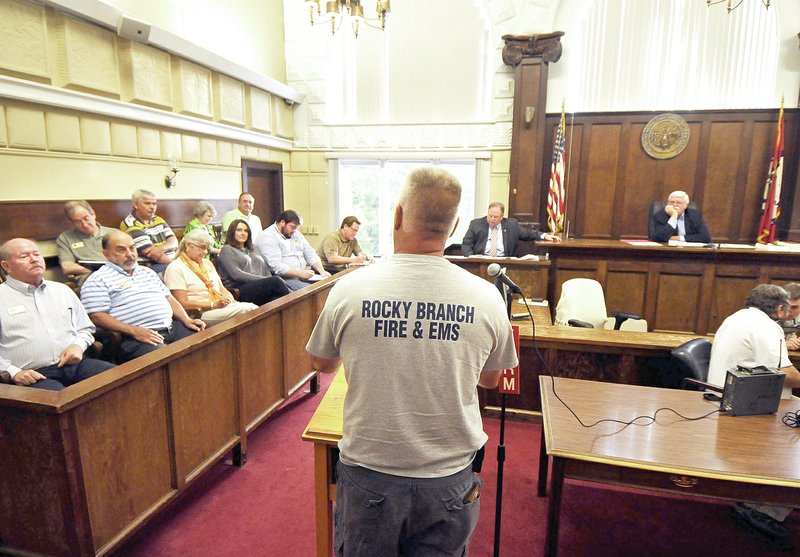BENTONVILLE -- A public hearing on Benton County's proposals to fund rural ambulance service drew about 50 people to the County Courthouse on Monday night but reached no real conclusions.
"I think it was a pretty good turnout," Tom Allen, justice of the peace for District 4, said of the meeting. "It seemed to me the majority of them favored the millage, but they were from outside the cities. I was hoping we might hear from folks from inside the cities as well since we've got a potential item on the ballot that would affect them too."
What’s Next
Quorum Court Meeting
The Benton County Quorum Court is set to consider the county’s plans for rural ambulance funding at its next meeting, set for 6 p.m. July 24 in the Quorum Courtroom at the County Administration Building, 215 E. Central Ave., in Bentonville.
The justices of the peace are considering a fee on rural households and a county millage to pay for the service. The county is required by state law to hold a public hearing on the proposal to form an emergency medical services district with an annual $40 fee. The district would cover all of the unincorporated areas of the county except the area served by the Northeast Benton County Fire Department. A similar plan with an $85 annual fee was rejected by voters in February.
The county also is considering a countywide millage of 0.2 mills to pay for the service. An additional 0.2 mill levy would increase the annual tax by $4 per $100,000 of value of the property, according to information from the county. The tax would apply to all rural and city residents.
Mike Crandall, county accounting manager, estimated the $40 fee would raise about $527,868. A millage levy of 0.2 mills would raise about $833,981, Crandall estimates. Revenue from either source would be dedicated to pay for rural ambulance service only.
Andy and Kathy Andreasen, who live near Lowell, both said they favored the millage proposal. Andy Andreasen said ambulance service to the rural areas is also a benefit to city-dwellers.
"We're inviting the people in the cities to share in the cost of that ambulance," he said.
Arnold Harp of Gentry also said he preferred the millage proposal over the household fee. Harp also said he's against the notion of a sales tax that was raised by some at the meeting.
"I don't think a sales tax will probably work," he said. "We're about as high as we can get and still be competitive with other states."
Harp said he still thinks the cities aren't dealing fairly with the county and county residents.
"They're really putting the squeeze on us because we have no recourse."
Willene Johnson, who lives east of Avoca, argued for substituting a sales tax proposal for the per household fee. She said everyone pays sales taxes, including visitors who may need ambulance service and don't otherwise pay the costs that residents do.
"You always put it on the households or the property owners," she said.
Theresa Pockrus, who lives on Rocky Comfort Road near Gentry, said she would support the 0.2 mill tax for ambulance service but not the per household fee. Pockrus said the cost of the millage increase is relatively low when weighed against the need to have ambulance service available in the rural areas.
"It goes to availability," she said. "Is it worth it to pay $4 a year for availability? The answer for me is yes."
While no public hearing is required for the millage, both plans were discussed Monday night. County Judge Bob Clinard said public input on both of the proposals is important since the justices of the peace haven't yet made a decision on putting one plan to a vote, sending both plans on for voter consideration or exploring some other option.
Service to the unincorporated areas is provided by seven municipal fire departments and the Northeast Benton County Fire Department. State law requires a "mutually acceptable" agreement between the cities and the county if municipal ambulance service is to be used outside the cities. Talks about the cost of ambulance service have been going on since 2009.
The county has paid the cities from its reserve in the past. The county has agreed to pay about $942,000 this year. Money to cover the cost of rural ambulance service in 2014 is being taken from several sources including $236,000 from county reserve funds and $450,00 cut from the Road Department budget for asphalt. The remainder will be made up from from savings in personnel costs or from county reserves. The cost of rural ambulance service is expected to rise to about $1.1 million in 2015 and about $1.2 million in 2016.
NW News on 07/15/2014
